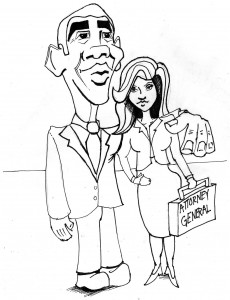‘Best-looking’ remarks opposite of sexist
As a figure upheld for his tolerance and politically correct take on the world, President Barack Obama has taken an incredible amount of heat from critics for a comment he made last Thursday at a fundraising lunch in Atherton, Calif., at the Democratic National Committee.
While praising California Attorney General Kamala Harris as “brilliant,” “dedicated” and “tough,” Obama also slipped in that she “happens to be, by far, the best-looking attorney general.”
By the indignant public backlash over the comment, one would think that the president had denied the Holocaust’s occurrence or used some sort of racial slur. Not the case. Instead, Obama’s mention of Harris’ physical attractiveness is being criticized as sexist.
Such a response to the president’s comment is a counterintuitive overreaction in that it only reinforces the prevalence of sexism in the modern age.
Despite Obama’s flood of high praise for Harris, a longtime friend and political supporter of his, the focus on the attractiveness comment completely overshadows his clear admiration for her character and success as a lawyer and California’s attorney general.
It is true that the president’s introduction of Harris would have been more than sufficient without the quip about her physical appearance, and the argument that Obama’s “best-looking attorney general” comment was inappropriate is a strong one. But focusing on this one poorly placed comment regarding a successful woman who also happens to be beautiful only perpetuates the blatant sexism that the comment’s critics are decrying.
These critics claim that acknowledging a woman’s physical attractiveness objectifies her and causes people to perceive her as just a physical body lacking in substance of character.
In an interview with CNN, Siobhan Bennett, president and CEO of the woman’s advocacy group She Should Run, claimed that the public’s likelihood to vote for a female candidate “drops like a stone” as soon as her physical attractiveness is mentioned.
Following this logic, Harris’ prospects in a rumored future run for California government must be slim.
Furthermore, in a piece for CNN, longtime contributor Ruben Navarrette argued that comments like this one would never be made toward powerful men. He claimed that the comment “objectifies a professional woman, and it is not something that you’re likely to hear said about a man with the same credentials.”
Many people, however, would beg to differ with Navarrette. Soon after Rep. Paul Ryan was announced as Gov. Mitt Romney’s running mate in the last election, for example, a popular Tumblr page was opened called “Hey Girl, It’s Paul Ryan.” The page, targeted toward young women, featured memes of Ryan making political statements that turned into romantic confessions.
Regardless of gender, then, even the most successful public figures have heard their attractiveness mentioned among their positive traits. Oddly enough, this has never been the thing to stop them from ascending to power.
Though meant to empower women, criticisms such as Bennett’s and Navarrette’s grossly oversimplify the issue. Lauding a woman for her intelligence and success in the professional world should not mean that casually referencing her beauty should cancel out those other, deeper qualities. Physical attractiveness and success, as it turns out, are not mutually exclusive.
Women have historically had to overcome some daunting obstacles and prejudices in the workplace and in the political sphere, and to completely ignore this would be to fallaciously and prematurely dismiss the argument that Obama’s controversial comment was sexist.
With this considered, however, it is important to move past an automatic assumption that men do not recognize women’s power and professionalism.
To denigrate Obama’s comments equates to the automatic dismissal of a woman’s strength of character and accomplishments as soon as her physical attractiveness is mentioned. This somehow suggests that if a woman is attractive, she could not possibly be talented or intelligent or a great leader, or vice versa.
Such a characterization is not only an annoying overreaction, then, but itself a harmful insult to women.
Sarah Cueva is a junior majoring in Middle East studies and political science. Her column “Homeland” runs Wednesdays.


Nice article, Sarah. I imagine Arnold probably heard comments along the lines of, “The most jacked governor in the US,” numerous times when he was in office. This is really no different, IMO.